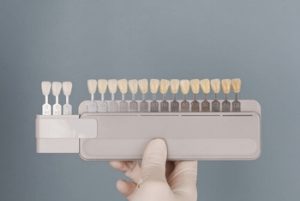Dental veneers have become a popular and effective solution in cosmetic dentistry for achieving a flawless smile. Zirconia and porcelain veneers are the most sought-after choices among the various types available. This extensive guide will delve into dental veneers, explore the differences between zirconia and porcelain veneers, and highlight the advantages of choosing them over their zirconia counterparts. By the end, you’ll understand why porcelain veneers might be the perfect choice for your smile transformation.
What are Veneers?
Veneers are thin shells of material placed over the front surface of teeth to improve their appearance. These dental treatments address various aesthetic concerns, such as discolouration, chips, gaps, and misalignments. Veneers are crafted to mimic the natural tooth structure, providing a seamless and natural-looking result. Different kinds of veneers include composite, porcelain, and zirconia veneers.
Types of Veneers
 Composite Veneers: Made from composite resin, these veneers are applied directly to the teeth and structured by the dentist. They are more affordable but less durable than other types of veneers.
Composite Veneers: Made from composite resin, these veneers are applied directly to the teeth and structured by the dentist. They are more affordable but less durable than other types of veneers.
Porcelain Veneers: These are crafted from high-grade porcelain, a material known for its strength, durability, and natural appearance. Porcelain veneers are curated in a dental lab and bonded to the teeth.
Zirconia Veneers: Made from zirconium dioxide, zirconia veneers are known for their exceptional strength and durability. They are often recommended for patients with significant dental damage or those who grind their teeth.
Why Choose Porcelain Veneers Over Zirconia Veneers?
Understanding the unique benefits and qualities can help you make an acknowledged decision when choosing between zirconia and porcelain veneers. While both types of dental veneers serve to uplift the appearance of your teeth, porcelain veneers often stand out for several reasons. In greater detail, Let’s explore the advantages of opting for porcelain veneers over zirconia veneers.
Aesthetic Superiority
Porcelain veneers are preferred because they more closely resemble the look of natural teeth than zirconia veneers. The translucency of porcelain mimics the natural tooth enamel, letting light pass through and reflect just like it would on a natural tooth. This characteristic gives porcelain veneers a more natural and lifelike appearance, making them an excellent choice for achieving a flawless smile that looks and feels genuine.
Traditional porcelain veneers are crafted from feldspathic porcelain, a material known for its superior aesthetic qualities. Feldspathic porcelain allows for fine detailing in the veneers’ shape, colour, and texture, ensuring they blend seamlessly with your surrounding natural teeth. This level of customisation is harder to achieve with zirconia veneers, which may have a more opaque appearance.
Minimal Tooth Reduction
One of the major benefits of porcelain veneers is the minimal tooth reduction required during the preparation process. A thin natural enamel layer is removed from the tooth surface to apply porcelain veneers. This minimal reduction helps preserve the natural tooth structure, maintaining your teeth’ overall health and strength.
In contrast, zirconia veneers often require more substantial tooth preparation due to their thickness and strength. This means that more of your natural tooth structure may need to be removed to adjust the veneer, potentially impacting the long-term health of your teeth.
Durability and Strength
While zirconia veneers are known for their exceptional strength and durability, porcelain veneers are also highly durable and can effectively tolerate the forces of biting and chewing. Modern advancements in dental materials have made porcelain veneers stronger and more resilient than ever. With proper upkeep and maintenance, porcelain veneers can last for many years, making them a worthy investment in your smile.
Biocompatibility
Porcelain is a biocompatible material unlikely to cause adverse reactions or sensitivities in the mouth. This makes porcelain veneers a safe and suitable option for most patients. Biocompatibility is an essential consideration, as materials not well-tolerated by the body can lead to complications and discomfort.
In contrast, some individuals may experience sensitivities with zirconia veneers due to the material’s properties. While zirconia is also considered a biocompatible material, it may be less well-tolerated by all patients, especially those with specific sensitivities or allergies.
Versatility in Cosmetic Dentistry
Porcelain veneers offer greater versatility in addressing various cosmetic dental issues. Porcelain veneers can achieve stunning results if you need to correct discolouration, close gaps, or reshape misaligned teeth. The ability to customise porcelain veneers’ structure, size, and colour makes them a preferred choice for achieving a personalised and natural-looking smile.
Porcelain veneers are particularly effective in cases where significant aesthetic improvements are needed. They can cover severe stains or discolouration that may not react well to teeth whitening treatments. Additionally, porcelain veneers can correct minor misalignments and gaps between teeth, providing a more uniform and aesthetically pleasing smile.
Natural Look and Feel
 One of the most compelling reasons to choose porcelain veneers is their natural look and feel. Porcelain veneers are crafted to closely mimic the appearance of natural teeth, making them virtually indistinguishable from your existing teeth. This natural aesthetic is achieved through porcelain’s clarity and light-reflecting properties, which create a lifelike appearance.
One of the most compelling reasons to choose porcelain veneers is their natural look and feel. Porcelain veneers are crafted to closely mimic the appearance of natural teeth, making them virtually indistinguishable from your existing teeth. This natural aesthetic is achieved through porcelain’s clarity and light-reflecting properties, which create a lifelike appearance.
Patients often report that porcelain veneers feel like natural teeth, providing a comfortable and natural sensation when eating, speaking, and smiling. This comfort is due to the veneers’ precise fit and smooth surface, which prevent irritation to the surrounding gum tissue and tooth surfaces.
Long-Lasting Results
Porcelain veneers are known for longevity, with many patients enjoying their beautiful smiles for a decade or more.
The durability of porcelain veneers is attributed to the strength of the material and the high-quality bonding agents used during the application process. When properly cared for, porcelain veneers can provide long-lasting results that tolerate daily wear and tear.
To maintain the longevity of porcelain veneers, it is crucial to practice a good oral regime, including regular brushing, flossing, and dental appointments. Avoiding habits such as biting on hard objects or using your teeth as tools can also help.
Minimal Maintenance
Maintaining porcelain veneers is relatively straightforward, requiring the same care as your natural teeth.
Regular brushing, flossing, and consistent dental visits are all needed to keep your veneers in excellent condition. Porcelain veneers resist staining, so you can eat your favourite foods and beverages without worrying about discolouration.
In contrast, zirconia veneers may require more specialised care to maintain their appearance and longevity. While both types of veneers benefit from good oral hygiene practices, porcelain’s natural stain resistance provides an added advantage.
Reduced Risk of Tooth Decay
Porcelain veneers can help protect the underlying natural tooth structure from damage and decay. By covering the front surface of the teeth, porcelain veneers act as a barrier, shielding the natural enamel from harmful bacteria and acids that can cause tooth decay. This protective quality is especially beneficial for patients with weakened or damaged enamel.
Improved Oral Health
Choosing porcelain veneers can have a positive impact on your overall oral health. By addressing cosmetic issues and improving the appearance of your teeth, you may feel more motivated to maintain good oral hygiene practices. The confidence boost that comes with a joyful smile can encourage better self-care and regular dental visits, contributing to long-term oral health.
Porcelain veneers can also help correct minor misalignments and bite issues, promoting better dental function and reducing the risk of oral health problems. Porcelain veneers can enhance your teeth’ aesthetic and functional aspects by creating a more uniform and balanced smile.
Veneers Procedure
The process of getting a dental veneer, whether porcelain or zirconia, typically involves several steps:
Consultation and Examination
The journey to a new smile begins with an appointment with your dentist. During this appointment, your dental consultant will examine your dental health, discuss your aesthetic goals, and observe if you are a suitable candidate for veneers. This is also an opportunity to discuss the differences between zirconia veneers vs porcelain veneers and decide which option is best for you.
Tooth Preparation
Once you decide to proceed with veneer treatment, the next stage is tooth preparation. For porcelain veneers, this involves extracting a small amount of the natural tooth enamel to create space for the veneer. This process is minimally invasive and aims to preserve as much of the natural tooth shape as possible.
Impressions
After tooth preparation, your dentist will take moulds of your teeth. These impressions are transferred to a dental laboratory, where qualified dental technicians will craft your custom veneers. If you opt for porcelain veneers, the lab will use high-quality ceramic materials, such as feldspathic porcelain or lithium disilicate glass ceramics, to create veneers that closely resemble your natural teeth.
Temporary Veneers
While your permanent veneers are being fabricated, your dentist may adjust temporary veneers on your prepared teeth. These temporary veneers safeguard your teeth and give you a look of your new smile.
Fitting and Bonding
 Once your custom veneers are finalised, you will return to the dental office for the final fitting. Your dentist will check the adjustment and appearance of the veneers, making any necessary adjustments. Once you and your dentist are satisfied with the fit, the veneers will be permanently attached to your teeth using a potent dental adhesive.
Once your custom veneers are finalised, you will return to the dental office for the final fitting. Your dentist will check the adjustment and appearance of the veneers, making any necessary adjustments. Once you and your dentist are satisfied with the fit, the veneers will be permanently attached to your teeth using a potent dental adhesive.
Final Adjustments and Polishing
After the veneers are attached, your dentist will make any final adjustments and clean the veneers to ensure a smooth and natural-looking finish. You will leave the office with a beautiful, transformed smile.
Conclusion
In the debate of zirconia veneers vs porcelain veneers, porcelain veneers emerge as the preferred choice for many patients seeking a natural, aesthetically pleasing, and long-lasting solution for their smile. The ability of porcelain veneers to closely mimic natural tooth enamel, combined with their durability, minimal tooth reduction, and biocompatibility, makes them an excellent option for achieving a flawless smile. If you are considering dental veneers to uplift your smile, porcelain veneers offer numerous advantages that can help you get the smile of your dreams.
If you’re ready to transform your smile and experience the benefits of porcelain veneers, contact Beyond Infinity Dental by dialling 02 8806 3799 to schedule your consultation. Our experienced team is here to help you achieve the smile you’ve always wanted with the highest-quality dental care.
References:
https://www.nature.com/articles/sj.bdj.2009.609
https://www.medicalnewstoday.com/articles/dental-veneers









